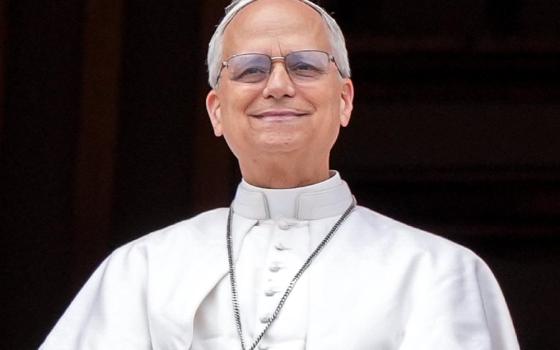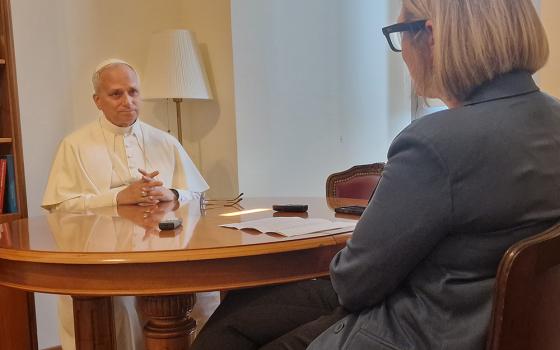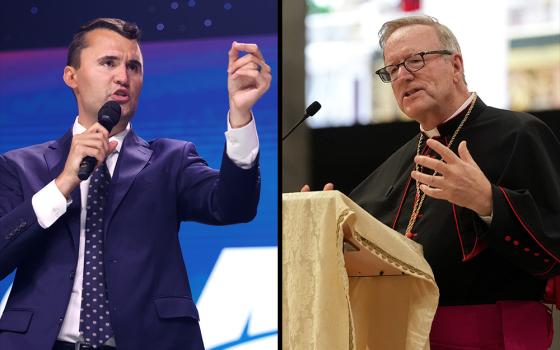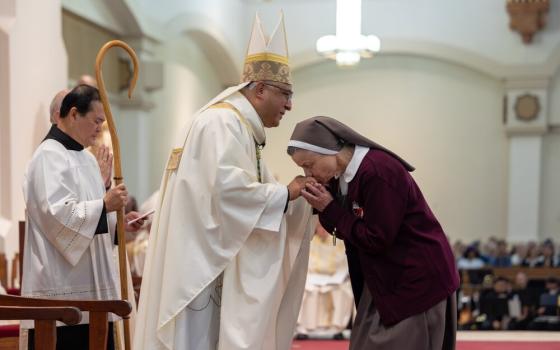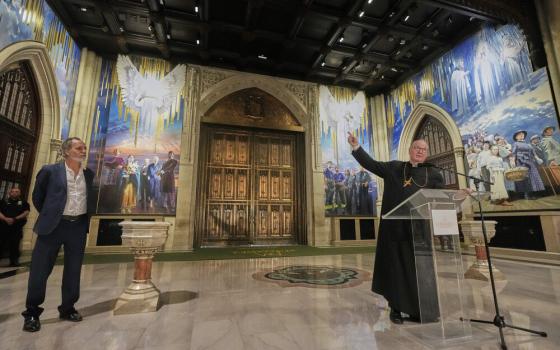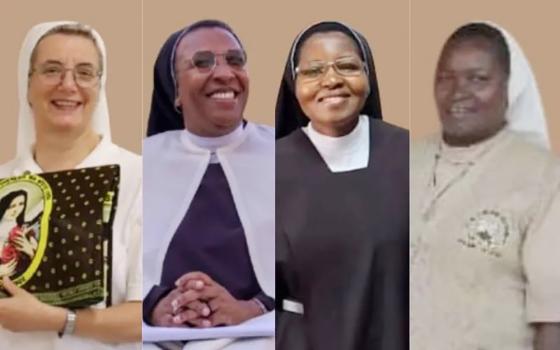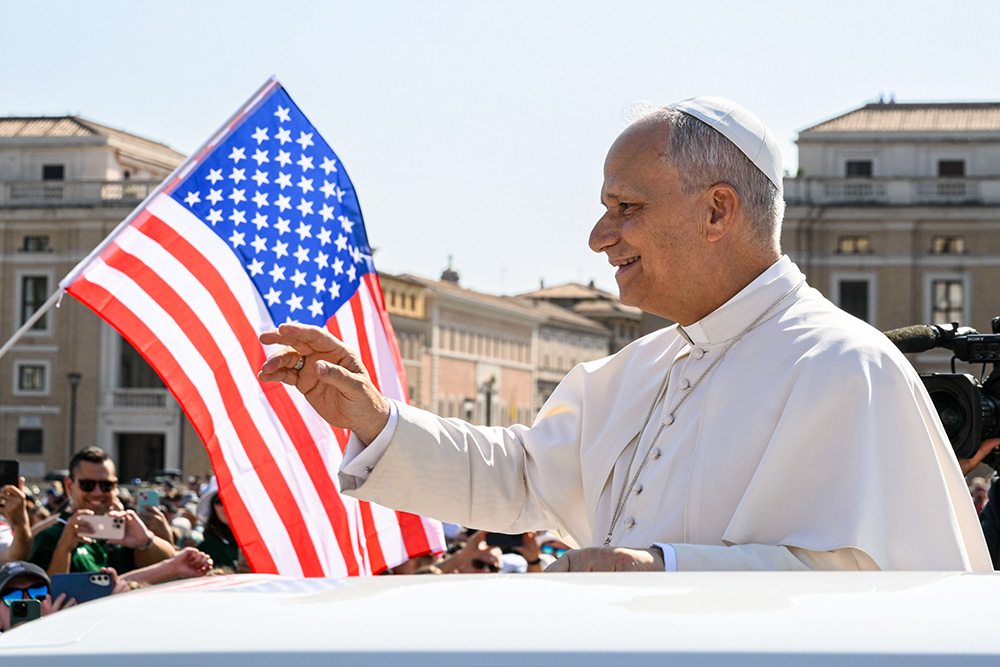
With a U.S. flag in the background, Pope Leo XIV waves to the crowd from the popemobile as he rides around St. Peter's Square at the Vatican before his weekly general audience Aug. 6, 2025. (CNS/Vatican Media)
When Pope Leo XIV praised migrants on July 25 amid President Donald Trump's mass deportation policies causing unrest in Southern California and throughout the country, few Americans knew what he was saying.
Until his comments were translated into English..
Fluent in English, Spanish and Italian, Leo spoke his words in the one language least likely to be understood in the U.S. — Italian.
"In a world darkened by war and injustice, even when all seems lost," the polyglot pontiff from Chicago said in Italian, "their courage and tenacity bear heroic testimony to a faith that sees beyond what our eyes can see."
Later translated into English, Leo called upon communities to welcome migrants and refugees as "a living witness to hope" as they show "the promise of a present and a future where the dignity of all as children of God is recognized."
When Leo emerged on the world stage May 8, he spoke to the crowds from the center balcony of St. Peter's Basilica in English, Italian and Spanish. Born American, a native of a culture often maligned for being rigidly monolingual, the pope dazzled with his linguistic command.
There are an estimated 1.5 billion English speakers in the world, compared to 68 million Italian speakers. The Anglophone world extends around the globe, while Italian is largely confined to Italy.
Like his predecessor, Leo has preferred to speak Italian in public settings.
Some Vatican analysts worry that something is being lost in translation.
Advertisement
Robert Mickens, a veteran Vatican watcher writing for UCA News, said that speaking in Italian dilutes the pope's impact. If he can speak other languages to a wider audience, he should. "A refusal to do so is, as scripture suggests, like hiding one's light under a bushel basket. This is certainly not an act of humility but one of irresponsibility," Mickens wrote.
In an email interview with the National Catholic Reporter, Mickens acknowledged that there is a potential downside if the pope speaks more English in public — likely pushback from the Italian-dominated Curia.
"The Italians are the ones who are really in opposition" to speaking English, Mickens said. "They are afraid of losing their control over the Church, and that control depends on Italian being the main language of the Roman Curia."
The first modern native Anglophone pope is missing out on an opportunity to expand his influence, Mickens said.
"Whether his Italian aides and minders like it or not, Leo should act quickly to ensure he's doing everything possible to reach that audience. That means he must not hesitate to use English on the world stage. He has no reason to apologize for this, nor is he obligated to justify it," Mickens wrote in his column.
Leo continues to communicate in the three languages he has mastered, most recently at the youth jubilee in Rome this summer. And when speaking to pilgrims from the Anglophone world, he will use his Chicago-accented American English.
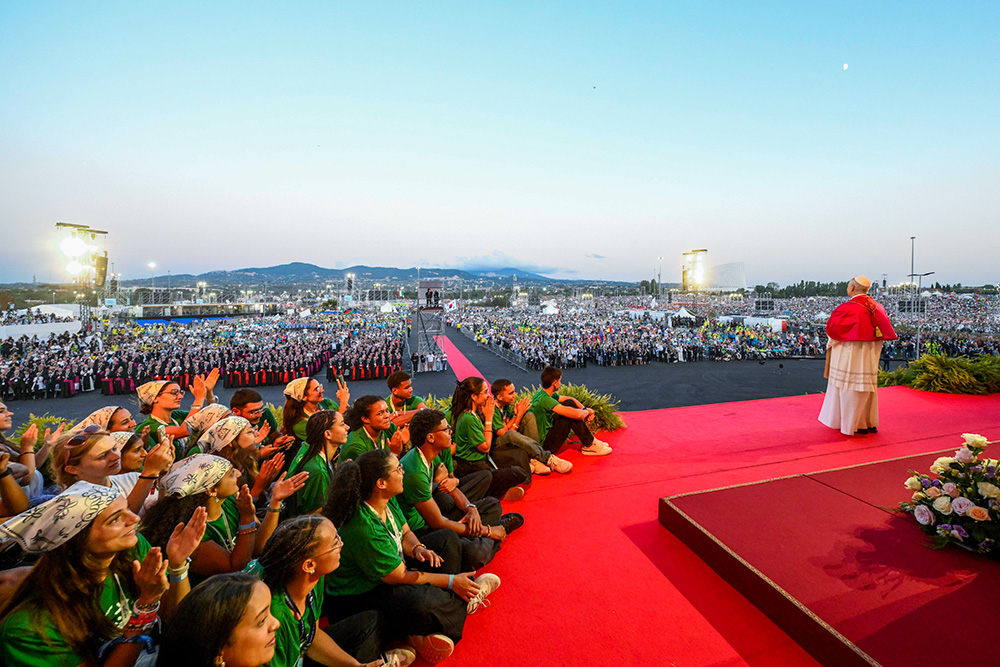
Pope Leo XIV presides over a prayer vigil in Rome's Tor Vergata neighborhood Aug. 2, 2025, with hundreds of thousands of young people gathered for the Jubilee of Youth. (CNS/Vatican Media)
At the Jubilee of Youth in Rome Aug. 3, Leo addressed a crowd of 1 million in soft-spoken tones in three languages. In English, he told the young people, "There is a burning question in our hearts, a need for truth that we cannot ignore." He praised them for their search for Christ.
Yet when he recently condemned violence in Gaza, including the shelling of the only Catholic church by Israeli forces, Leo spoke in Italian.
Some Vatican watchers and advisers say there are good reasons why the pope prefers Italian.
Jesuit Fr. James Martin, editor-at-large for America magazine and consultant to the Dicastery for Communications for the Vatican, said in an interview with NCR that the message of the pope is important, not so much the language in which he communicates it.
"When speaking at the Vatican, and in settings like the Angelus, it makes sense that Pope Leo would speak Italian — he's the bishop of Rome, after all," Martin said.
"In English-speaking settings, he speaks English," Martin said. "And even when he is speaking mainly to the English-speaking world on topics like immigration, his remarks are immediately translated into English, so I don't think it's much of an issue. What matters most is what the Holy Father says, not so much in what language he says it."
Christopher White, senior fellow at the Institute on Catholic Social Thought at Georgetown University and former NCR Rome correspondent, said English is an effective way for the pope to communicate on world issues.
'Clips of him pleading for an end to war and condemning the barbarity that we are currently witnessing are far more likely to echo around the world if he is doing so in his mother tongue of English.'
—Christopher White
The youth jubilee — seen as a coming-out event for the new pope to present his personality to the world — is a model. More English speakers should hear his voice, White said, as Leo addresses such issues as Gaza and immigration.
"The reach of the Italian language is limited," White said. "When he is making international appeals that he hopes will reverberate around the world, he should consider how his own language skills might be a real opportunity for the church. Clips of him pleading for an end to war and condemning the barbarity that we are currently witnessing are far more likely to echo around the world if he is doing so in his mother tongue of English."
Thomas F.X. Noble, emeritus professor of history at the University of Notre Dame, said Leo is carefully navigating the impact of being the first U.S. pope who also has experience in Rome and Peru and holds dual American and Peruvian citizenship.
"We have an American pope who was elected in large part because he is not exclusively American," Noble said.
While English is a dominant language, it is also "the world's most ideologically charged language," Noble said. "Were Leo to speak English often and publicly I suspect that he would attract unwelcome criticism as 'too American' or 'just an American.' "
Vanessa Corcoran, a professor of church history at Georgetown, said the language choices the pope has made so far make sense. She noted that during his video address aired at the ballpark for the White Sox, the pope spoke in Chicago-style English.
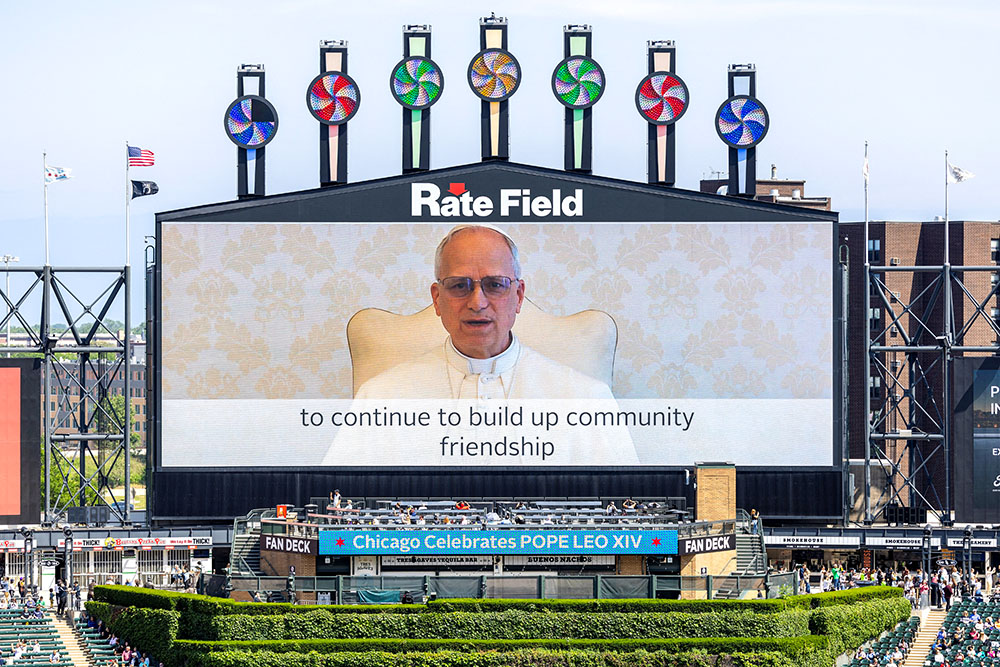
Corcoran noted that the pope has spent roughly a third of his life in the U.S., a third in Peru and the rest in Italy. So it is not surprising that he is seen as more of a worldwide figure, able to adjust his language for the appropriate audience.
It's easy to see why some Americans would prefer the pope to address issues in English, especially at a critical time in the United States where, she said, there is a need for a moral compass on issues such as immigration and Gaza.
But she said sometimes the most powerful messages transcend language. She noted that Pope Francis' most famous remark may have been his question "Who am I to judge?" It was originally said in Italian but quickly reverberated around the world.
Sometimes messaging transcends language.
For Leo, Corcoran said, the widely distributed photograph of him cleaning up after a Peruvian flood when he was a bishop there indicated to the world a church leader who is "the pope in the muddy boots," at ease mixing with the faithful.
"It's not to say that the pope's message doesn't have meaning in another language," Corcoran said. "He is the leader of the global church."
Much will hinge on the pope's travel schedule, which Corcoran and others say they hope will include a visit to the United States during the nation's 250th birthday. If he comes to the U.S., they said, Leo is sure to speak in a clear Midwestern English accent, with Spanish mixed in as well, reflecting the reality of the church in his native land.

